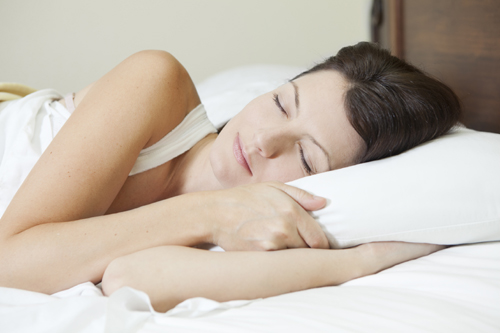当前位置: Language Tips> 双语新闻
Tackling fears 'while you sleep'

|
US researchers suggest smells could be used to calm fears - while people sleep. People were trained to associate two images, linked to smells, with fear. During sleep they were exposed to one of those smells - and when they woke they were less frightened of the image linked to that smell. A UK expert praised the study and said it could help treat phobias and perhaps even post-traumatic stress disorders. People with phobias are already commonly treated with "gradual exposure" therapy while they are awake, where they are exposed to the thing they are frightened of in incremental degrees. This study suggests that the theory could be extended to therapy while they are in slow-wave, or deep, sleep. This is the deepest period of sleep, where memories, particularly those linked to emotions, are thought to be processed. The researchers showed 15 healthy people pictures of two different faces. At the same time they were given a mild electric shock. They were also exposed to a specific smell, such as lemon, mint, new trainers, clove or wood. Later, when they were awake, they were shown both faces - without the scents or shocks. They showed less fear when shown the face linked to the scent they had smelt while asleep than when shown the other face. Their response was measured through the amount of sweat on the skin and fMRI (functional magnetic resonance imaging) brain scans. People were in slow-wave sleep for between five and 40 minutes, and the effect was strongest for those who slept for longest. Dr Katherina Hauner, of the Northwestern University Feinberg School of Medicine, Chicago, who led the study, said: "It's a novel finding. We showed a small but significant decrease in fear. "If it can be extended to pre-existing fear, the bigger picture is that, perhaps, the treatment of phobias can be enhanced during sleep." She said phobias would be the most obvious area to pursue, as cues tended to be relatively simple, compared with the more complex post-traumatic stress disorder (PTSD). And she said much more research was needed to fully understand the effects this therapy could have. "This was just one day. We really need to see if it can last weeks, months or years." Jennifer Wild, consultant clinical psychologist at the King's College London Institute of Psychiatry, said: "The sleep study is excellent and has implications for treating phobias and stress disorders, such as post-traumatic stress, where there are a whole range of cues. "Many people who have survived traumatic events, such as fires or road traffic accidents, have a physiological fear response to triggers of their memories. "Triggers often include smells, such as smoke, petrol, antiseptic smells and alcohol. Infusing these smells during periods of slow-wave sleep could help to extinguish the fear response." Dr Wild added that the theory could perhaps be extended by exposing people to subtle sounds linked to phobias or traumatic memories during their sleep. |
美国研究人员发现,在睡眠过程中,我们可以借助气味来缓解恐惧不安的心情。 研究人员让实验者将两种和气味有关的影像与恐惧联系在一起。 在睡眠过程中,研究人员让实验者嗅到一种令人恐怖的气味,而当他们睡醒的时候,对于那种气味的恐惧感则会下降。 一位英国专家对此发现赞赏有加,并声称这将有助于帮助治疗恐惧,以及事故后期残留的精神混乱等病情。 当前,恐慌症患者在意识清醒的状态下接受“逐步暴露”治疗,即逐步接受那些让他们感到恐慌的事物。 此项研究可能帮助患者实现在短波、或深度睡眠间的治疗。 在深度睡眠的过程中,大脑对记忆,特别是那些影响人的情绪的记忆,进行加工。 研究人员向15名健康的人一边展示不同的画面,一边释放例如柠檬、薄荷、新跑鞋和丁香等味儿,同时对他们进行轻微的电击。 当这些人醒来后,再向他们展示之前的画面。这一次,没有气味、也不实施电击。 实验表明,与之相关气味的作用下,人们对于图片的恐惧相对减少。与之相对的,不曾闻到气味的人对于图片的恐惧明显要多得多。 而人们的这种恐惧反应死通过对体表汗液和大脑皮层的功能感应反映图像对比测得。 对于那些睡眠时间在5~40分钟的人来说影响不大。睡眠时间越长,这种反差更明显。 这项研究的负责人,芝加哥西北大学博格药品研究分院的凯瑟琳博士说:“这是一项崭新的发现,我们发现,人们的恐惧情绪大大降低。” “若将此项研究推广,我们很有希望在患者睡眠中对其进行恐慌治疗,” 她还说,较之更复杂的病症,恐慌症病情简单,从而很有可能成为最有研究前途的领域。她表示,若想全面了解这项研究的影响还需作进一步的研究。 “当前的结果只是我们做一天的实验得出的。我们还有待考证,这一结果在几周,几个月,甚至是几年之后是否依旧正确。” 伦敦理工大学的医疗顾问生理学家波奇璀说:“这一睡眠研究很不错,它将推动如事故后遗症造成的恐慌和精神压力的治疗,有很大的研究空间。” “对于很多在诸如火灾、道路交通事故等不幸中幸存下来的人来说,记忆带给他们不尽的后续伤痛。 “而导致这些痛苦回忆的诱因有很多,包括浓烟、汽车燃油。防腐剂和酒精的气味等。如若在他们熟睡之间释放这类气体,将缓解他们的恐慌。” 沃尔德博士还指出,我们还可以就此延伸,研究在深度睡眠过程中,与记忆相关的别的因素,如气体,是否对缓解人们的恐慌心理是否同样奏效呢? (译者 浅辄@翻译 编辑 丹妮) |
上一篇 : 工程师错将桥面安反 智利首个吊桥不得不推迟交付
下一篇 : 俄前女间谍发布个人时装品牌 女包灵感来自名著
关注和订阅


电话:8610-84883645
传真:8610-84883500
Email: languagetips@chinadaily.com.cn